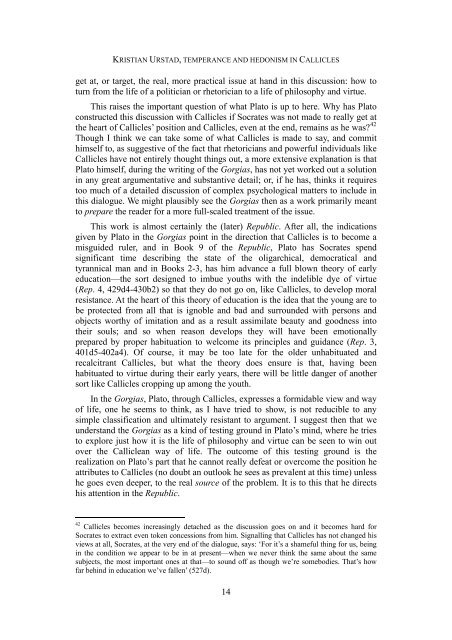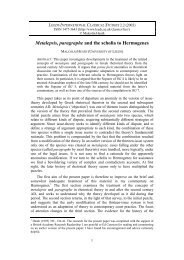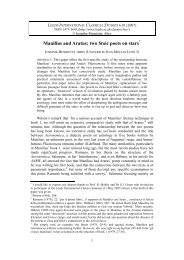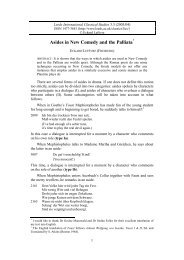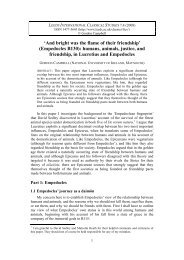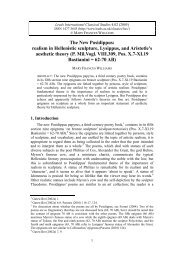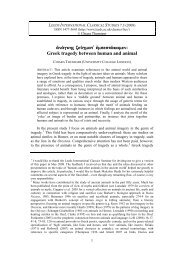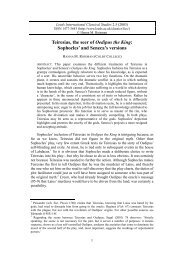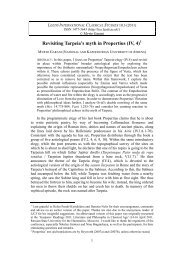The question of temperance and hedonism in Callicles - Leeds ...
The question of temperance and hedonism in Callicles - Leeds ...
The question of temperance and hedonism in Callicles - Leeds ...
Create successful ePaper yourself
Turn your PDF publications into a flip-book with our unique Google optimized e-Paper software.
KRISTIAN URSTAD, TEMPERANCE AND HEDONISM IN CALLICLES<br />
get at, or target, the real, more practical issue at h<strong>and</strong> <strong>in</strong> this discussion: how to<br />
turn from the life <strong>of</strong> a politician or rhetorician to a life <strong>of</strong> philosophy <strong>and</strong> virtue.<br />
This raises the important <strong>question</strong> <strong>of</strong> what Plato is up to here. Why has Plato<br />
constructed this discussion with <strong>Callicles</strong> if Socrates was not made to really get at<br />
the heart <strong>of</strong> <strong>Callicles</strong>’ position <strong>and</strong> <strong>Callicles</strong>, even at the end, rema<strong>in</strong>s as he was? 42<br />
Though I th<strong>in</strong>k we can take some <strong>of</strong> what <strong>Callicles</strong> is made to say, <strong>and</strong> commit<br />
himself to, as suggestive <strong>of</strong> the fact that rhetoricians <strong>and</strong> powerful <strong>in</strong>dividuals like<br />
<strong>Callicles</strong> have not entirely thought th<strong>in</strong>gs out, a more extensive explanation is that<br />
Plato himself, dur<strong>in</strong>g the writ<strong>in</strong>g <strong>of</strong> the Gorgias, has not yet worked out a solution<br />
<strong>in</strong> any great argumentative <strong>and</strong> substantive detail; or, if he has, th<strong>in</strong>ks it requires<br />
too much <strong>of</strong> a detailed discussion <strong>of</strong> complex psychological matters to <strong>in</strong>clude <strong>in</strong><br />
this dialogue. We might plausibly see the Gorgias then as a work primarily meant<br />
to prepare the reader for a more full-scaled treatment <strong>of</strong> the issue.<br />
This work is almost certa<strong>in</strong>ly the (later) Republic. After all, the <strong>in</strong>dications<br />
given by Plato <strong>in</strong> the Gorgias po<strong>in</strong>t <strong>in</strong> the direction that <strong>Callicles</strong> is to become a<br />
misguided ruler, <strong>and</strong> <strong>in</strong> Book 9 <strong>of</strong> the Republic, Plato has Socrates spend<br />
significant time describ<strong>in</strong>g the state <strong>of</strong> the oligarchical, democratical <strong>and</strong><br />
tyrannical man <strong>and</strong> <strong>in</strong> Books 2-3, has him advance a full blown theory <strong>of</strong> early<br />
education—the sort designed to imbue youths with the <strong>in</strong>delible dye <strong>of</strong> virtue<br />
(Rep. 4, 429d4-430b2) so that they do not go on, like <strong>Callicles</strong>, to develop moral<br />
resistance. At the heart <strong>of</strong> this theory <strong>of</strong> education is the idea that the young are to<br />
be protected from all that is ignoble <strong>and</strong> bad <strong>and</strong> surrounded with persons <strong>and</strong><br />
objects worthy <strong>of</strong> imitation <strong>and</strong> as a result assimilate beauty <strong>and</strong> goodness <strong>in</strong>to<br />
their souls; <strong>and</strong> so when reason develops they will have been emotionally<br />
prepared by proper habituation to welcome its pr<strong>in</strong>ciples <strong>and</strong> guidance (Rep. 3,<br />
401d5-402a4). Of course, it may be too late for the older unhabituated <strong>and</strong><br />
recalcitrant <strong>Callicles</strong>, but what the theory does ensure is that, hav<strong>in</strong>g been<br />
habituated to virtue dur<strong>in</strong>g their early years, there will be little danger <strong>of</strong> another<br />
sort like <strong>Callicles</strong> cropp<strong>in</strong>g up among the youth.<br />
In the Gorgias, Plato, through <strong>Callicles</strong>, expresses a formidable view <strong>and</strong> way<br />
<strong>of</strong> life, one he seems to th<strong>in</strong>k, as I have tried to show, is not reducible to any<br />
simple classification <strong>and</strong> ultimately resistant to argument. I suggest then that we<br />
underst<strong>and</strong> the Gorgias as a k<strong>in</strong>d <strong>of</strong> test<strong>in</strong>g ground <strong>in</strong> Plato’s m<strong>in</strong>d, where he tries<br />
to explore just how it is the life <strong>of</strong> philosophy <strong>and</strong> virtue can be seen to w<strong>in</strong> out<br />
over the Calliclean way <strong>of</strong> life. <strong>The</strong> outcome <strong>of</strong> this test<strong>in</strong>g ground is the<br />
realization on Plato’s part that he cannot really defeat or overcome the position he<br />
attributes to <strong>Callicles</strong> (no doubt an outlook he sees as prevalent at this time) unless<br />
he goes even deeper, to the real source <strong>of</strong> the problem. It is to this that he directs<br />
his attention <strong>in</strong> the Republic.<br />
42 <strong>Callicles</strong> becomes <strong>in</strong>creas<strong>in</strong>gly detached as the discussion goes on <strong>and</strong> it becomes hard for<br />
Socrates to extract even token concessions from him. Signall<strong>in</strong>g that <strong>Callicles</strong> has not changed his<br />
views at all, Socrates, at the very end <strong>of</strong> the dialogue, says: ‘For it’s a shameful th<strong>in</strong>g for us, be<strong>in</strong>g<br />
<strong>in</strong> the condition we appear to be <strong>in</strong> at present—when we never th<strong>in</strong>k the same about the same<br />
subjects, the most important ones at that—to sound <strong>of</strong>f as though we’re somebodies. That’s how<br />
far beh<strong>in</strong>d <strong>in</strong> education we’ve fallen’ (527d).<br />
14


